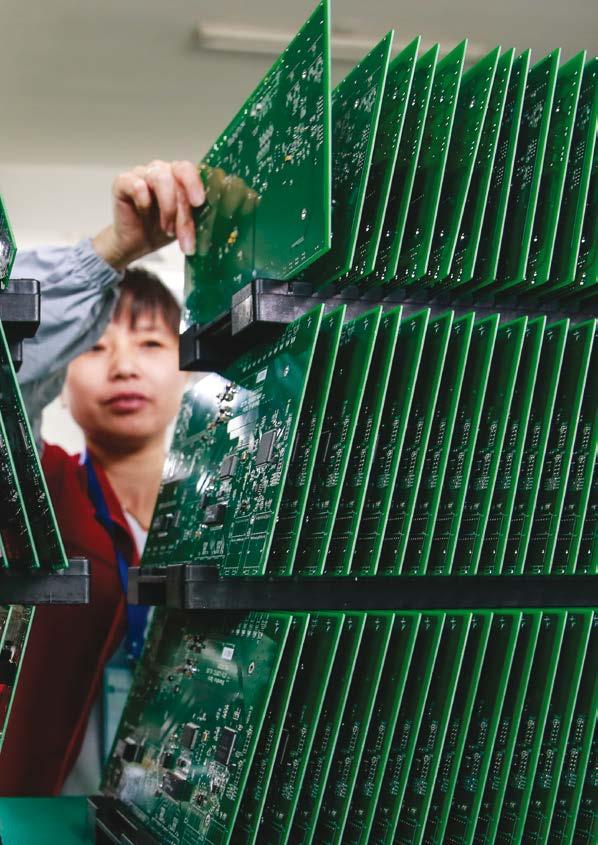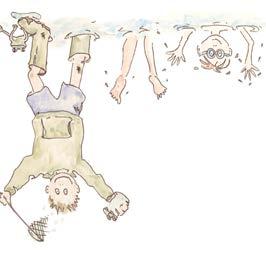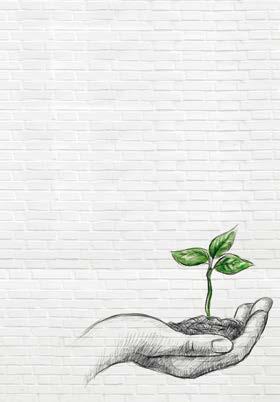
9 minute read
Carbon omissions: accounting for stuff
ZERO CARBON BRITA N
How should we account for imported goods as we work towards zero carbon? In this edited extract from CAT’s Zero Carbon Britain: Rising to the Climate Emergency report, we look at how we can measure and reduce the impacts of goods and materials produced outside our borders.
It is widely assumed that decarbonisation is basically an energy problem. From a world perspective it is true that greenhouse gas emissions (GHG) arise principally from burning fossil fuels but, from a national point of view, direct energy emissions might account for little more than half the total depending on what we define as ‘our emissions’ – meaning those we are responsible for.
Whose emissions? The table shows the effects on the total GHG emissions of the UK in 2016 by adopting various ‘frames’ of responsibility. There are good and bad reasons for choosing any of these frames but, broadly speaking, decarbonisation gets harder, and more expensive, as you move down the list. That is one reason why governments and most research institutions try to stick to the ‘easy end’ and assume that the rest will somehow be dealt with elsewhere. But these emissions do occur, and the responsibility has to be picked up somewhere. They are in fact ‘carbon omissions’ that need to be accounted for if we are to take the mitigation process seriously.
In CAT’s Zero Carbon Britain scenario we have adopted a compromise frame, incorporating traditional ‘production accounts’ and international aviation and shipping, but not imports of goods and materials, or land use change abroad that would be attributed to our food consumption.
Land use change abroad In some accounts, land use change abroad that is attributable to food consumption in the UK amounts to as much as 100 MtCO 2 e per year, though our knowledge about the extent of this issue is incomplete.
It is a very complex issue, but it is estimated that the problem arises largely from consumption of livestock products within a globalised market – for example, clearing forests to rear cattle that we import and eat or to grow feed for UK livestock.
For this reason, the dietary changes and food importing rules in our Zero Carbon
2016 UK emissions (MtCO 2 e) Frame
383 Emissions from direct UK energy use.
473 All GHG emissions arising from UK territory, less carbon captured by soils and plants. Often called a 'production account' it is the basis of current international agreements on climate change (the UNFCCC's Kyoto Protocol) and official emissions targets and carbon budgets.
515
784
(up to) 884
All production GHG emissions, plus those from international aviation and shipping.
Emissions associated with all goods and services consumed, including imports, minus exports. Often called a 'consumption account' or our 'carbon footprint'.
All consumption emissions plus emissions associated with land use change abroad attributable to UK food consumption, sometimes referred to as 'indirect land use change'.
UK GHG emissions associated with various frames, and details of what the frames include. The frame used for our scenario is highlighted in italics. Data is taken from BEIS (2019) and Audsley et al. (2009).
Britain scenario – no imports of livestock or feed – can be considered to reduce indirect land use change effects to a negligible level.
The ‘stuff’ we import In CAT’s scenario, carbon emissions from imported goods are considered only by stating that our scenario must be part of a concerted global effort to reduce greenhouse gas emissions – the UK alone cannot ‘solve’ climate change. Other nations also have to decarbonise at rates and along trajectories coherent with their fair share of the global carbon budget. This means that GHG emissions associated with the production of goods that we import are accounted for globally.
However, it has been widely argued that allocation of responsibility for GHG emissions should not be on the basis of production, but consumption. In other words, the emissions from all goods and services should be allocated according to who consumes them and not from where they are produced.
This is bad news for wealthy countries like us that import a great deal of goods and commodities, but good news for countries that export large amounts, like China. Of course, whatever the accounting conventions, the total world emissions remain the same – the national totals would just be allocated differently.
It could be asked then, if production accounts are good enough for current international agreements regarding emissions reduction, like the Kyoto Protocol, why quibble?
The argument, however, is that accounting based on production seems somehow unfair, open to abuse, and leaves a distinct impression of accounting fraud. For example, on a consumption basis, taking net imports into account, we find that the UK has much higher emissions. Unlike production emissions, which have declined considerably from 818 MtCO 2 e in 1990 to 503 MtCO 2 e in 2017, consumption emissions have actually increased from 862 MtCO 2 e in 1997 to 996 MtCO 2 e in 2007 before declining in recent years to 784 MtCO 2 e in 2016.
Since fairness is likely to be a key component of any international decarbonisation process, consumption as well as production emissions are important when considering nations’ contributions to tackling climate change. Although we have not modelled it in our scenario, we can make some general suggestions about what we could do to decrease these emissions if we were to include our responsibility
ZERO CARBON BRITA N

Should we be aiming to manufacture more of the essential ingredients of a Zero Carbon Britain, like wind turbines, within our own borders?
for imported goods and still aim for zero carbon. For instance, the emissions associated with the import of food could be reduced from a potential 59 MtCO 2 e to less than 1 MtCO 2 e (assuming a decarbonised energy and transport system), which shows what can be done through a combination of reduction in demand, altered product choice, and increased domestic production. Based on this example, a number of additional things could help us decrease the consumption emissions from the ‘stuff’ we import:
• Reducing how much we buy (or consume), whether it is produced at home or abroad. • Encouraging long-life products, productservice systems, and much higher levels of reuse and repair. This would also reduce the demand for goods. • Importing items with lower or zero greenhouse gas emissions, including alternative low or zero carbon materials – for example, bioplastics and composites. • Increasing imports that would constitute additional ‘carbon capture’ – for example, the import and use of wood products. According to our rough calculations, current use of imported timber and wood products results in an additional 42 MtCO 2 e captured per year. With more use of plant-based products in buildings and infrastructure, this could go part way to ‘balancing out’ additional emissions from imports. • Producing more in the UK – domestic production of which the UK is entirely capable, but has systematically off-shored because production is cheaper elsewhere, could be reclaimed and increased once again. This might mean higher industrial energy demand, and perhaps more non-energy emissions. We might need to install more energy infrastructure and capture more carbon as a result. Fewer imports would, however, decrease fuel demand for aviation, shipping and UK distribution even further.
Having said this, with a somewhat deindustrialised economy deeply dependent on imports for finished goods and raw materials, rapidly increasing domestic production may be problematic for the UK. Furthermore, with higher emissions at the start of the decarbonisation process, we might fail to keep to a carbon budget that would give a reasonable chance of avoiding a 2 o C global average temperature rise. The purchase of international credits might be necessary to aid the transition, or a re-assessment of geoengineering options to remove CO 2 from the atmosphere may indeed have to be considered. Neither of these options, however, provide an alternative to decarbonisation – they would simply ‘buy us time’.
Using consumption accounting methods would almost certainly make it more challenging to get to net zero, but some of the changes mentioned here might be beneficial to the UK – for example, we might create more jobs by producing more at home.
There are many unanswered questions and, unlike the rest of our scenario, we have not quantified any of these effects or explored the possibilities. How much more energy infrastructure would we need? What are the options for low or zero carbon materials currently? Do we have enough land to capture sufficient carbon? How much might demand for goods reduce? These are areas we would love to look into in more depth, and will form important subjects for further research. CS
Zero Carbon Britain: read the full report. You can read CAT’s Zero Carbon Britain: Rising to the Climate Emergency report online or buy your copy from our online shop at www.cat.org.uk/zcb. For news about our new Zero Carbon Britain Hub and Innovation Lab, aimed at helping turn climate emergency declarations into Zero Carbon Action plans, see news page 5.
Imaginative Holidays for Imaginative Children EcoWeek Camps 2020 at CAT, in the Peak District and on the Isle of Man EcoWeek Camps 2020

Seven days for 8-1 5 year olds to save the planet, play games, sing songs, make friends and cook amazing chocolate cakes Hagg Farm Saturday 25th July - Saturday 1 st August CAT EcoCabins Saturday 1 st - Saturday 8th August Saturday 8th - Saturday 1 5th August Isle of Man Saturday 1 5th - Saturday 22nd August All weeks £350 Includes ferry to the IoM
Escorted travel available from Birmingham (CAT), Manchester/Sheffield (Hagg Farm) and London/Liverpool (Isle of Man)
www.ecoweek.org.uk www.ecoweek.org.uk
P R I N T I N G M A I L I N G S I G N A G E Personal, Friendly, Affordable and Knowledgeable.
We are accredited to the ISO 14001:2015 Environmental Systems Standards. l l l WPG can also supply Carbon Balanced Paper. l l l 4 Trees are planted for every 1.5 tonnes of paper printed on. l l l At WPG we ensure that all materials and waste products can be recycled at WPG.

Contact us today for a free no-obligation quote.
T R O P H I E S
01938 552260
sales@wpg-group.com www.wpg-group.com
feelgood windows

Enjoy the comfort and energy efficiency of triple glazed timber windows and doors
Options to suit all budgets
Follow your ethical beliefs Make a difference Achieve positive social change Influence shareholder meetings


Independent financial advisers for the ethically minded










